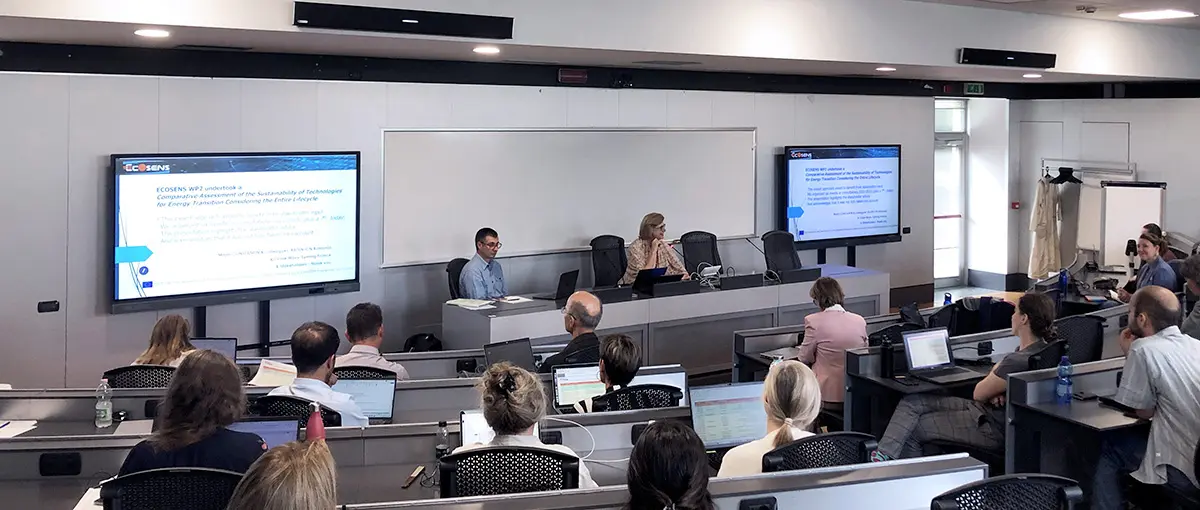ECOSENS: Economic and Social Considerations for the Future of Nuclear Energy in Society

As the EU-funded ECOSENS project concludes with its final conference at Politecnico di Milano, research has highlighted that nuclear energy must be considered not only from a technical and economic standpoint, but also in relation to social values, environmental constraints, and long-term sustainability.
From 8–9 September 2025, the Department of Management, Economics and Industrial Engineering of Politecnico di Milano hosted the final conference for the project ECOSENS - Economic and Social Considerations for the Future of Nuclear Energy in Society. The event brought together partners, institutions and stakeholders to share the results of three years of collaborative research.
The conference provided a key opportunity to reflect on the project’s findings and its attempt to reframe how Europe thinks about nuclear energy. At a time when climate change, energy security, and sustainability dominate the public agenda, ECOSENS has worked to close the gap between technological potential and societal realities.
The sustainability of nuclear technologies is intimately linked to the societal acceptance and future of nuclear energy. The objective of the ECOSENS project was to reassess the role of nuclear energy in Europe by integrating societal perspectives into sustainability evaluations, ensuring that decisions on nuclear technologies take into account not only technical and economic factors but also social values, ethics, and long-term challenges.
The project’s defining strength has been its transdisciplinary approach. Engineers, economists, social scientists, policymakers, and civil society actors were brought into the same conversation. Rather than treating nuclear energy purely as a technical or political issue, ECOSENS explored it as part of broader social, cultural, and economic contexts. This dialogue was not abstract: citizens, NGOs, municipalities, and industry representatives participated in workshops and surveys, contributing perspectives often absent from energy planning.
For Italy, where nuclear is re-entering the national debate after decades on the sidelines, these insights arrive at a crucial moment. They show that decisions on nuclear are not just about kilowatts and investment returns: they are about fairness, intergenerational responsibility, and trust. Within this perspective, Work Package 3, led by Prof. Giorgio Locatelli, Prof. Paolo Trucco, and Eng. Giacomo Dei (Department of Management, Economics and Industrial Engineering), with contributions from Prof. Marco Ricotti (Department of Energy) and support from Prof. Benito Mignacca (University of Cassino), provided a significant and innovative contribution.
Economic assessments of nuclear power have traditionally relied on investor-focused models that struggle to capture the true value (beyond monetary terms) of infrastructure that lasts a century. ECOSENS advanced the scientific discussion by developing a new approach that better considers long-term perspectives, bringing into view the concerns of consumers, governments, suppliers, and investors. This approach is especially relevant for Italy’s policy choices, considering the need to decarbonise and deal with a system where renewables play an increasingly relevant role.
Equally important, the project integrated environmental limits into its assessments. By embedding planetary boundaries and circular economy thinking into economic models, ECOSENS provided a framework that acknowledges finite resources and environmental costs. In practice, this means nuclear energy can no longer be assessed only on financial efficiency but also on its compatibility with a sustainable future.
The project has delivered more than new methodologies: it has built networks of trust across disciplines and borders, produced policy recommendations rooted in real societal input, and created a platform for ongoing dialogue. For practitioners, whether in government, industry, or research, the outcomes provide tools to better anticipate public concerns, evaluate costs and benefits more realistically, and make decisions that are robust over the long term.
As ECOSENS concludes, the work does not stop. Aligning nuclear energy with societal values remains a continuing challenge, particularly in Italy’s accelerating energy transition. Thanks to this project, we now have stronger tools, clearer insights, and, most importantly, a shared understanding that sustainable energy futures must be co-created with society.